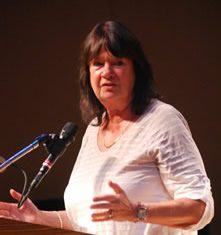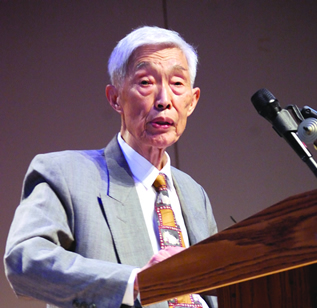Helga Zepp-LaRouche Speech
Transforms Beijing Conference on New Silk Road
by William Jones
September 2014
 Helga Zepp-LaRouche. |
September 7 (EIRNS)--Helga Zepp-LaRouche addressed a major forum Sept. 5, on “One Belt, One Road” in Beijing sponsored by China Investment magazine, which is an arm of the National Development and Reform Commission, the main economic policy planning commission under the State Council of the Chinese government. The first of what is intended to become an annual event, the forum was attended by researchers from many major Chinese think-tanks tasked with the mission of developing a program for the Silk Road Economic Belt. While there were diplomats from a number of embassies also in attendance and actively participating in the event, the Schiller Institute seemed to be the only foreign think-tank attending the conference.
In a speech prior to Mrs. Zepp-LaRouche, Professor Bao Shixiu, who was also a speaker, underlined the role of Lyndon and Helga LaRouche in creating the New Silk Road idea. In the ten minutes allotted for her speech, she went through the role of the Schiller Institute in developing the concept of the Eurasian Land-Bridge at the beginning of the 1990s, culminating in the Beijing conference in 1996. While several economic crises intervened to interrupt what was meant to be a peace order for the 21st century, she said, President Xi's speech in Astana, Kazakhstan, last year created a new wave of optimism which has transformed the world. She then elaborated the nature of the financial crisis, warning of a greater blow-out ahead and listing the "four laws'' developed by Lyndon LaRouche for getting the world out of the crisis and propelling it into the future: the Glass-Steagall Act bank separation; a Hamiltonian National Bank; a Hamiltonian credit policy with investment aimed at building infrastructure on the basis of a long-term credit arrangements; and a space-based scientific driver program aiming at developing fusion energy and mining helium-3 on the Moon as the fuel for the program. She then urged that the New Silk Road program be crafted in order to pull the world away from geopolitics and to establish a new paradigm based on the common interests of mankind.

EIRNS/Stuart Lewis..
Bao Shixiu. |
Her speech immediately placed the whole question on a higher plane and, for those who weren't acquainted with Mrs. Zepp-LaRouche, it came as something of a surprise. During the Q&A and in the afternoon session, there was, however, a tendency to return to the “geopolitics” approach, with a number of further interventions by Zepp-LaRouche to bring things back on track. At one point, a somewhat disgruntled professor, who seemed to be quite happy with having China remain a largely agricultural country, reacted to what he thought she had said. Whether or not he misunderstood, or was simply “ventilating,” a number of the speakers went out of their way to praise the perspective she had raised.
There were also a number of younger people in attendance, and one of them got up at this point, saying that he had not intended to speak at all, but felt the need to do so at this point in order to underline the importance for China of what Zepp-LaRouche had just said. The itinerant professor was probably duly chastened as he made no further remarks during the remainder of the conference.
At the banquet following the conference, many of the participants came up to her table to toast her contribution. And the organizers themselves were overjoyed with the conference which they felt had been transformed by Helga Zepp-LaRouche's participation.
